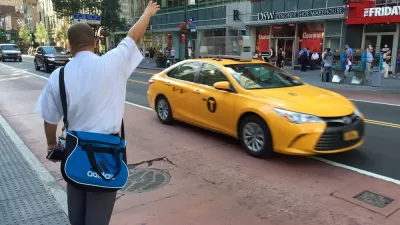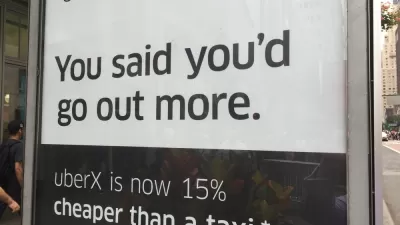There are two schools of though t when it comes to whether Uber and other companies like it are making traffic better or worse. A new study by new York City will endeavor to clear the air.
Carl Bialik takes an in-depth, data-focused look at the congestion implications of transportation network companies like Uber—especially in light of the recent controversy in New York City when Mayor Bill de Blasio proposed a cap on the number of "for-hire" drivers in the city.
After noting that the "city will move ahead with a four-month study of the for-hire industry, examining how it has affected traffic, air quality, noise and public health," Bialik examines the spotty and unreliable data currently available about the impacts of Uber. So, for instance, fewer cars are entering Manhattan, but the cars that are there are traveling much slower.
Bialik notes that both the cities data and Uber's data are murky. The article cites traffic models by Charles Komanoff (who believes that Uber is contributing to worsening congestion in the city, but acknowledges a "very big 'if'"). On the other side is Mark Kleiman, professor of public policy at New York University’s Marron Institute of Urban Management, who thinks that "[e]verybody’s making up stories about how Uber might be bad… but apparently those stories don’t require any evidence whatsoever."
FULL STORY: The Debate On Uber’s Impact In New York City Is Far From Over

Planetizen Federal Action Tracker
A weekly monitor of how Trump’s orders and actions are impacting planners and planning in America.

Restaurant Patios Were a Pandemic Win — Why Were They so Hard to Keep?
Social distancing requirements and changes in travel patterns prompted cities to pilot new uses for street and sidewalk space. Then it got complicated.

Map: Where Senate Republicans Want to Sell Your Public Lands
For public land advocates, the Senate Republicans’ proposal to sell millions of acres of public land in the West is “the biggest fight of their careers.”

Maui's Vacation Rental Debate Turns Ugly
Verbal attacks, misinformation campaigns and fistfights plague a high-stakes debate to convert thousands of vacation rentals into long-term housing.

San Francisco Suspends Traffic Calming Amidst Record Deaths
Citing “a challenging fiscal landscape,” the city will cease the program on the heels of 42 traffic deaths, including 24 pedestrians.

California Homeless Arrests, Citations Spike After Ruling
An investigation reveals that anti-homeless actions increased up to 500% after Grants Pass v. Johnson — even in cities claiming no policy change.
Urban Design for Planners 1: Software Tools
This six-course series explores essential urban design concepts using open source software and equips planners with the tools they need to participate fully in the urban design process.
Planning for Universal Design
Learn the tools for implementing Universal Design in planning regulations.
Heyer Gruel & Associates PA
JM Goldson LLC
Custer County Colorado
City of Camden Redevelopment Agency
City of Astoria
Transportation Research & Education Center (TREC) at Portland State University
Camden Redevelopment Agency
City of Claremont
Municipality of Princeton (NJ)




























